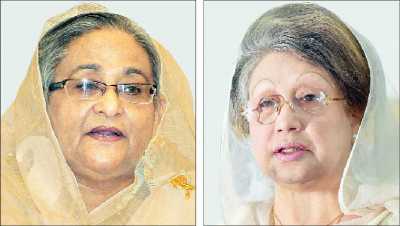News >> Politics
Worry over ‘uncertain’ polls
 29 Aug, 2013
29 Aug, 2013
The main political issue being talked about with concern at different levels across the country is the uncertainty over election to the tenth parliament as the ruling and opposition parties are heading for a severe confrontation centering the polls.
The general election is due to be held by January 24 as on that date the tenure of the present ninth parliament will expire, but, due to the political deadlock over the poll-time administration, almost everyone now faces the troubling question as to whether the polls will be held at all.
According to sources, the crux of the crisis is that the ruling and opposition parties are poles apart on the structure of the government that will oversee the election. Awami League insists that the election be held as per the amended constitution under an interim government headed by Prime Minister Sheikh Hasina while BNP opposes it tooth and nail and vows to resist such polls. The main opposition party threatens to force the government through mass movement to restore the caretaker government system scrapped through the 15th amendment.
The national media, general people, civil society and foreign diplomats have long been calling for a dialogue between the ruling and opposition parties to resolve the political standoff, but all in vain. Even after UN Secretary-General Ban Ki-moon advised both Sheikh Hasina and Khaleda Zia in phone calls recently to hold dialogue and reach consensus on election issue, the two top leaders continued to stick to their guns, declining to budge from their rigid stands.
But neither would give up the UN chief—he has decided to send UN Assistant Secretary-General for Political Affairs Oscar Fernandez Taranco to Dhaka next month to carry forward the mission. The initiative taken by the world body’s chief executive has created some hope among the people for a peaceful end to the crisis. Meanwhile, keeping in line with the UN chief’s initiative, western diplomats met the Election Commission officials on Tuesday and informed them that they want the next election to be credible and participated by all. But there is no breakthrough yet in sight.
However, possibly under the positive impact of the UN move that both the ruling and opposition parties have started speaking of talks aimed at resolving the standoff. But a very few believe that Sheikh Hasina and Khaleda Zia will ever be able to sit together and reach a consensus on the caretaker government issue. They still move in their own ways to force one’s will upon the other.
Against this backdrop, the resolution of the political standoff remains as absurd as ever and the scheduled election seems very uncertain. And this unwarranted development has plunged the people in a state of grave agony and
despair.
Contacted for his opinion in this state of national politics and polls, eminent lawyer Dr Shahdeen Malik struck a highly pessimistic note and told daily sun that there would be no dialogue between the ruling Awami League and opposition Bangladesh Nationalist Party (BNP) regarding election-time government.
“I think there will be no dialogue between the two major political parties,” he said.
Regarding uncertainty centering the next general election he said that an election will be held as there is a constitutional obligation but the election would not be participatory one at all.
“Election will be held as per constitutional obligation but the election will not be participatory,” Dr Shahdeen Malik said. In that eventuality, he predicted, the country is waiting to see intensified political unrest and bloodshed.
Professor Imtiaz Ahmed of Dhaka University’s International Relations Department said that both Awami League and BNP have to agree to sit for dialogue to hold a free, fair and non-violent election as non-participatory polls would not be acceptable at all.
“There is no alternative to a participatory election as the UN, the US, the EU, China and other foreign friends have already been engaged in this matter,” he said.
He said that political parties have to make way out to resolve political crisis as previous experience is bitter in case of failure of the political leaders.
“I am hopeful that the country will see a participatory, free, fair and non- violent election. There has to be also agreement to prevent post-electoral violence in the country,” he said.
Dhaka University’s Political Science Department professor Gias Uddin Molla noted that the UN Secretary-General and diplomats of the foreign countries are urging two political parties to resolve political crisis through dialogue.
“There should be constructive dialogue between the two major political parties for the sake of holding free, fair and non-violent election,” Gias Uddin Molla said.
He holds the hope—after all this—that the next general election will be held despite uncertainty.
“I am optimistic that the next general election will be held with all parties’ participation, including of BNP,” he said.
Source: Daily sun

